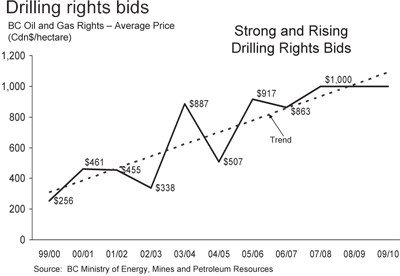Natural Gas Prices
Natural Gas Price Forecast
Natural gas prices are expected to average $5.65 (Canadian dollars per gigajoule at plant inlet) in 2006/07, down $2.90 from
budget and 25 per cent lower than 2005/06. This lower outlook is mainly due to the milder winter and cooler summer weather
patterns experienced in 2006, resulting in reduced demand for heating and electricity generation. In addition, there was no
upward price pressure from the relatively mild hurricane activity in 2006 — especially compared to the impacts from the severe
supply/distribution disruptions caused by Hurricane Katrina and Hurricane Rita in 2005.
The forecast assumes the price of natural gas rises to $6.50 in 2007/08 as the effects of mild winter weather are not expected
to repeat. Prices are forecast to increase 3.1 per cent to $6.70 in 2008/09 mainly reflecting tight supply markets before
settling at about $6.50 in the next two years.

High Storage Levels
High natural gas storage levels pose the greatest short-term risk with potential significant downside price volatility. The
effects of milder winters, weaker demand and lower prices resulted in high natural gas inventory levels in 2006 and early
2007. The storage level in 2006 was above 2005 all year and 15 per cent higher than the five-year average (2001 to 2005) at
year end. Higher levels continued in January 2007, possibly indicating downward price pressure in 2007. Levels did decline
in late January and early February in response to much colder weather in the Midwest and northeast US and eastern Canada.

As an indicator of the impacts of weather and price volatility, January 2007 natural gas prices at Henry Hub Louisiana, a
major natural gas hub supplying US north east markets, ranged from $5.40 to $7.76 ($US/MMBtu). This 44 per cent increase mainly
reflected a change from relatively mild weather in early January to significantly colder weather later in the month.
Medium-term Prospects Positive
Despite falling natural gas prices, industry interest in acquiring drilling rights in BC remained strong in 2006/07 due in
part to government programs and initiatives to promote BC's natural gas potential and attract industry investment. Continued
strong interest in drilling rights acquisitions is a positive indicator of future development and production activity. The
2006/07 average price per hectare is expected to be $863, rising to $1,000 in each of the next three years of the fiscal plan.

North American Natural Gas Markets
The interdependence of energy commodities including electricity, oil, coal and natural gas has resulted in increased prices
for coal and electricity over the past few years. As an increasing amount of electricity supply is generated from natural
gas fired plants, electricity prices will be influenced by natural gas price swings and natural gas prices will be increasingly
sensitive to electricity demand.
North American demand for natural gas is mainly supplied from North American sources as offshore imports (in the form of liquefied
natural gas) are relatively small and not expected to increase significantly over the forecast horizon. Potential increased
supply due to proposed pipeline projects from Alaska and northern Canada would help alleviate the supply-demand gap but are
not expected to be in service over the medium-term outlook. In the absence of any new significant North American natural gas
discoveries, prices are expected to remain firm reflecting continued tight supply markets although producers' reactions to
the current high inventory levels could lead to increased price volatility in 2007.
Risks and Sensitivities
BC natural gas royalty revenues are very sensitive to natural gas prices and the forecast allowances in the revised three-year
plan incorporate risks associated with price volatility. A price change of Cdn$1.00 per gigajoule results in about $325 million
revenue change. Risks and factors associated with natural gas prices include:
- global economic growth particularly in US and China;
- industry investment intentions (drilling activity and drilling rights acquisition);
- technological advancements affecting exploration and extraction;
- capital markets (interest rates and industry profitability);
- industry interest/commitment in other energy projects (e.g. oil sands, coal fired electricity plant);
- effects on industry of federal government changes with respect to the tax treatment of income trusts;
- New Relationships with First Nations;
- environmental considerations; and
- weather
BC Government and Private Sector Forecasts
The Ministry of Energy, Mines and Petroleum Resources uses private organizations and internal analysis in the preparation
of the natural gas price forecast. BC's royalty price forecast is based on the average of private sector forecasts, converted
for unit and pricing point differences and adjusted to a fiscal year outlook.
